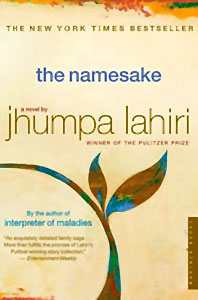 The agony of the Indian young adults born in the US, the very beat of the problems like generation gap weaves the story of the novel, Namesake. The novel is a perfect picture of life with its entire eccentricities, including the names that are mocked and at the sametime the heart-rendering stories behind those names , echoes the typical Indian anguish and everything that is ironic and bitter whilst justifying the title of the novel.
The agony of the Indian young adults born in the US, the very beat of the problems like generation gap weaves the story of the novel, Namesake. The novel is a perfect picture of life with its entire eccentricities, including the names that are mocked and at the sametime the heart-rendering stories behind those names , echoes the typical Indian anguish and everything that is ironic and bitter whilst justifying the title of the novel.
Popularly known as Jhumpa Lahiri Vourvoulias was originall born with the name of Nilanjana Sudeshna in 1967. She is a prominent American writer or author born in London, England and raised in South Kingstown, Rhode Island, of Indian descent. She currently lives in New York City. Jhumpa Lahiri was born in London, England in July 1967. she spent her childhood with full life and brought up in South Kingstown, Rhode Island. She brought up in America but her mother always tried to give her children Indian origin. She was always taught about her Bengali heritage from an early age. Lahiri graduated in English literature from Barnard College in 1989. She then received multiple degrees from Boston University as for instances an M.A. in English, an M.A. in Creative Writing, an M.A. in Comparative Literature and a Ph.D. in Renaissance Studies. She took up a fellowship at Provincetown`s Fine Arts Work Center. In 2001, she married Alberto Vourvoulias-Bush, a journalist who was then Deputy Editor of TIME Latin America. Lahiri currently lives in Brooklyn with her husband and two children. She has been a Vice President of the PEN American Center since 2005.
Synopsis:
The Namesake is Jhumpa Lahiri`s first novel that was published in 2003. The book spans more than thirty years in the life of a fictional family, the Gangulis. The book is all about the generation and cultural gap as when the parents, each born in Calcutta immigrated to the United States as young adults. Their children, Gogol and Sonia, grow up in the United States. Both the parents were from calcutta and their children brought up in US so there are huge differences between the childen and their parents. One of the major themes of the book is Gogol`s persistent mixed feelings over his identity, by the fact that Gogol is the last name of a noted Russian author. This is also a novel about exile and its discontents, a novel that is as affecting in its Chekhovian exploration of fathers and sons, parents and children, as it is resonant in its exploration of what is acquired and lost by immigrants and their children in pursuit of the American Dream. This can be felt from heart.
Being published by the famous publisher Houghton Miffin in 2003, `Namesake` is written by the promising writer Jhumpa Lahiri.
The namesake has a breathtaking beauty. It feels like one of the author`s short stories. The author follows a life rather than following a plot. Some may find it uninteresting but in most of the cases the readers will be able to feel the punch.













